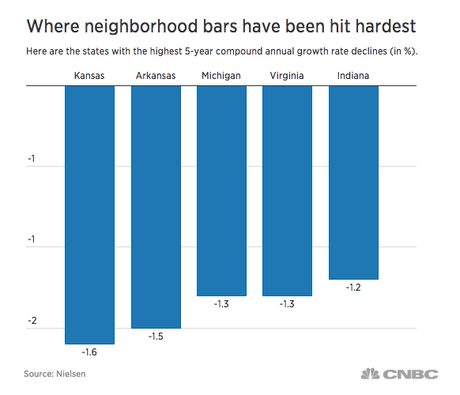
There's an epidemic sweeping the country and it's not our national addiction to hops.
Rather, it's the slow decline of a place where we once built our drinking identities, where sticky counter tops or well-worn tap handles can bring about nostalgia for drinking days gone by. For many bars around the country, closing time is coming earlier - in a permanent way.
Over the last decade, an average of 1,000 bars a year have closed. In 2015, that number was six a day. It's a phenomenon even more advanced in England.
But that's not to say this type of business is doomed, even as drinkers seek out more authentic experiences and on-premise sales slump. Instead, a new type of neighborhood location is emerging where everybody knows your name.
"Until the last five years or so, if you said 'bottle shop,' people thought of a wine store," said Chris Creech, co-owner of The Glass Jug, a tap and retail space in Durham, North Carolina. "We're not the dark, dingy bar and we're also not the grocery store beer aisle. Like a lot of bottle shops, we want a friendly, neighborhood vibe."
Here in North Carolina, beer laws, affordable real estate and a very thirsty public have led to a boom of beer bottle shops - a combo of bar and retail space. In October, I wrote a piece for All About Beer detailing how these businesses are boosting the beer scene in Durham.
Across seven interviews with shoppers, owners and beer enthusiasts, two themes kept popping up:
- These stores thrive on education, trying to bring new beer drinkers into the fold.
- Bottle shops don't just have their own niche - they're starting to replace other locations where we once drank.
"I like going to breweries, but I don't go to bars anymore," said Mike Fuller, a regular at The Glass Jug. "You're surrounded by people who truly enjoy beer and want to share this beer-loving experience."
Across the country, that sentiment is spreading.
According to Mario Gutierrez, vice president with Nielsen TDLinx, there's a strong movement toward speciality bars and brewpubs because "consumers don't just want to go to places where they get drinks they already have at home."
Naturally, the shift is because of the continued attention drinkers pay to craft beer and all the variety that segment offers. "If you think about the neighborhood pub, it's not really in a position to offer 35 beers on tap," Gutierrez said. "That tends to be a specialized establishment."
For instance, here are five states hit hardest by loss of bars:

For comparison, here is the growth of breweries in those same states, according to the Brewers Association:
With the spread of more craft beer in these states and an assumption that "own-premise" drinking at breweries is on the rise, perhaps this is all stealing some share from the bars where beer lovers used to drink. With so much variety, these niche stores who focus on craft from the get-go can thrive.
But it also could be more than that.
"Even the novice beer drinker who stumbles into a bottle shop hears those are the places they need to be these days," said Glenn Cutler, half of the North Carolina beer-promoting duo known as the NC Beer Guys. "Bottle shops see themselves as a resource to move people along the craft beer spectrum because people are always looking to try something new."
But these types of stores aren't just about selling beer, either. In Durham, The Glass Jug hosts regular community events, from intermediate-level bike rides to knitting and crafts and "Just Us Gals," a female-only educational and social gathering. In the truest sense, businesses like this are trying to ingrain themselves as part of their neighborhood's community.
Of course, laws and regulations are different across the country and these on-premise/retail hybrids don't exist everywhere, but as the U.S. drinking culture matures both in its drinkers and its legal attitude, it seems to be a very strong player in how the neighborhood hangout will change, too.
"These types of shops allow people the opportunity to see what craft beer has become and they always have something for anyone," Fuller said. "Regardless of where you are in the craft beer spectrum, there's something special about being in a place like that."
Read more: How Bottle Shops Are Boosting Durham's Beer Scene
Bryan Roth
"Don't drink to get drunk. Drink to enjoy life." - Jack Kerouac

